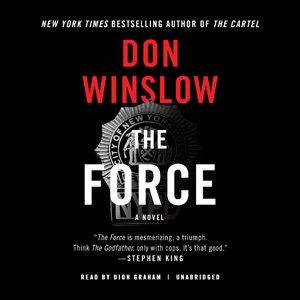
The similarities don’t end there. In both stories, the stultifying and morally questionable powers that be come up against a loose cannon Irish cop. In this case it’s Detective First Grade Denny Malone, and his turf is Manhattan North, which includes Harlem and the Upper West Side. Malone is the king of all he surveys because he’s a chief detective in The Force, short for the Manhattan North Special Task Force. “Malone and the Task Force, they weren’t just any cops on the Job. You got thirty-eight thousand wearing blue, Denny Malone and his guys were the 1 percent of the 1 percent of the 1 percent – the smartest, the toughest, the quickest, the bravest, the best, the baddest,” we’re told.
It’s no surprise that all manner of people want to take him down.
Malone’s story starts with a spectacular heroin bust, and the consequences of that flow through the city, the justice system, and the lives and careers of all Winslow’s characters. The essential question of the book is, whom do you trust?
A good cop novel is a thing of beauty. It shows every side of human nature; people struggling against poverty, the odds, themselves; the human comedy and life’s tragedies; bold acts of selfless heroism; and, often, a meticulous deconstruction of how high-minded public servants go bad. This novel has all that.
Expectations for The Force are high. Winslow’s 2015 exposé of drug trafficking, The Cartel, was excellent. So was The Power of the Dog before that. His plots snare and bind his characters ever more tightly. Malone, his partner Phil Russo, and his best friend Bill ‘Big Monty’ Montague are people you want to root for, even if they’re a little dirty. The secondary characters, from Malone’s snitches to his girlfriend, and from the dealers and gang leaders to lawyers and city officials are also well drawn.
Thanks to literary ground already well-trod in numerous classics, including Peter Maas’s biography Serpico (1973) and Richard Price’s Clockers (1992), up to current examples like Joseph Knox’s Sirens (2017), you know there’s a dark side to big city policing, that drugs and cash flow like water, and that there’s not much incentive to avoid the little payoffs that lead to the bigger payoffs that lead straight to Hell. Winslow describes that world, that environment of small compromises and seemingly inconsequential little deals exceedingly well. In fact, Malone even tells himself that his payoffs are simply fines levied on the bad guys and, in many cases, the only punishment the system will ever exact from them.
In short, we get to see how corruption works, in detail, from the inside. That’s why it’s puzzling that he brings the key officials together for a scene near the end of the book in which Malone climbs up on a soapbox and recites their malefactions. The author tended toward preachiness in The Cartel too, but there it seemed warranted, since so many Americans are oblivious to the problems he exposed.
But readers of The Force likely know plenty about official corruption. For starters, Winslow has just spent more than 400 pages showing it to them. Bleak as The Wire was, some cops tried to do the right things the right way, some characters redeemed themselves after grievous errors, and some city institutions actually tried to make life better for citizens. In The Force, everyone is compromised. A little good can only be accomplished by doing a lot of bad. While you may believe widespread corruption exists, it takes a high level of cynicism to think it is the only social force at work.
Dion Graham’s narration provides distinct voices, good humour, and an urgent delivery that carried me through to the end, which probably would have been a little harder to accomplish in the print version. Although he tells a powerful story with excellent characters and a living, breathing, crime-filled city as a backdrop, an author of Winslow’s stature and gifts could have crafted it with a touch more subtlety.
HarperCollins
Audiobook/Print/Kindle/iBook
£6.68
CFL Rating: 3 Stars